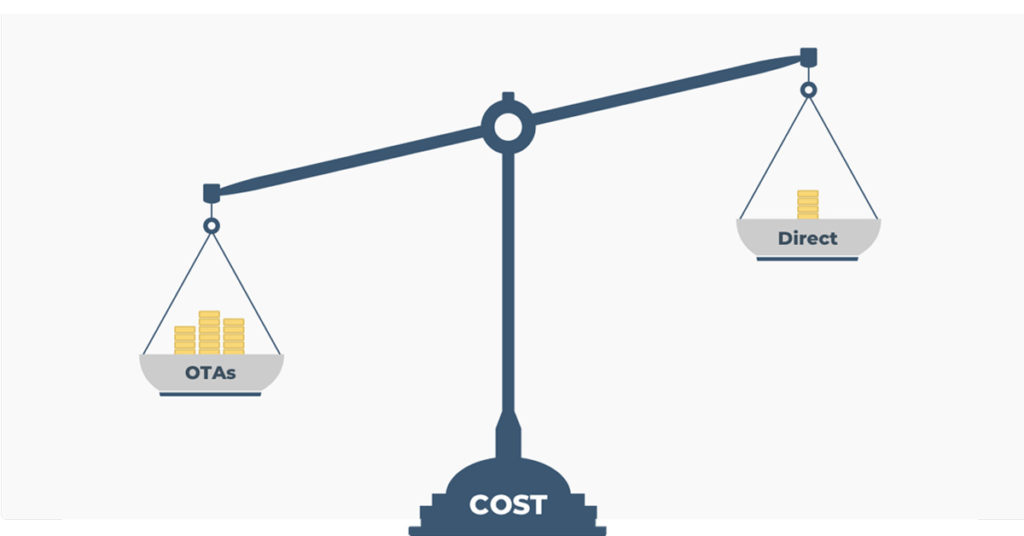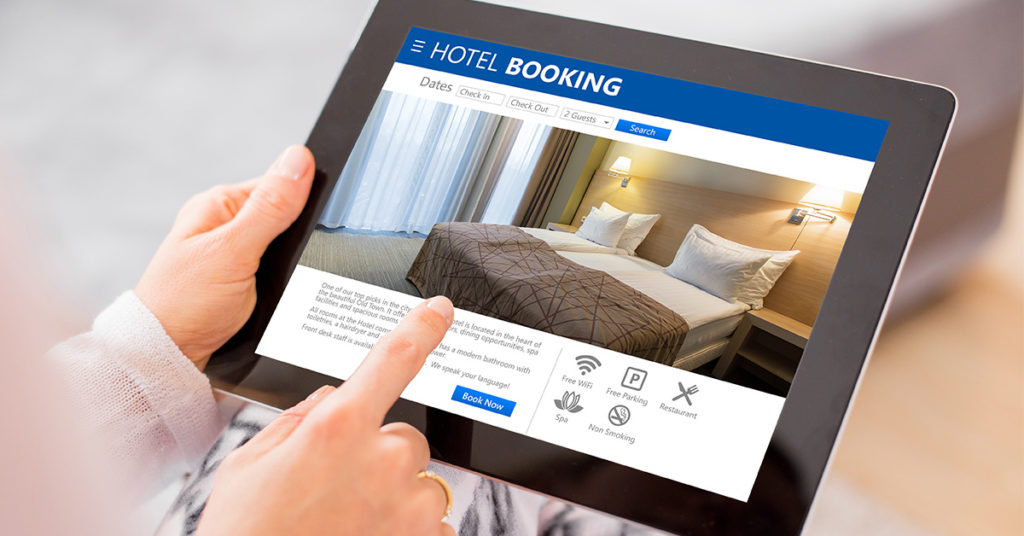
In Part 1 of this two-part article series we revealed an upside that lies hidden in the ashes of the Covid-19 crisis, namely the opportunity for hoteliers to regain control of their online distribution.
NB: This is an article from Bookassist
Never, since the emergence of OTAs and their inventory land grab over 20 years ago, has such an opportunity arisen. It likely won’t arise again. So Don’t hand your hotel’s upturn to the OTAs
Now more than ever your hotel needs profit and cashflow to rebuild business, so don’t throw it away on unnecessary costs. Act now, or you will be wrong-footed once travel starts again.
First, a reality check
No one will stay at your hotel unless they feel safe in doing so. Travellers will increasingly favour hotel brands that clearly demonstrate strong cleanliness and hygiene protocols in response to Covid-19. Conversely those that don’t demonstrate sufficient concern for the safety and wellbeing of their guests and staff will suffer damage. Therefore it is imperative that you communicate the exact steps you are taking to ensure your guests’ stay is virus-free.
Hotel groups are already taking the initiative on this with clear public statements prominent on their websites. Temperature screening, keyless and contactless check-in and check-out, plexiglass barriers at front desks, reduced capacity public spaces with physical distancing rules, these are all on the table.
No online booking strategy, whether direct or indirect, will have any uplift for you unless you clearly demonstrate that it is safe to stay. Website, social, and email marketing all play their part in communicating regular updates to your guests, past, present and future to give them the assurances they need today.
So what are the 10 steps you need to take now?

1. Don’t get sucked back into over-dependence on OTAs
OTAs have been the focus of much criticism for how they have dealt with hotels during this crisis. In a show of zero support from them for their suppliers, refunds were forced upon hoteliers who were fighting for their survival.
OTAs themselves of course are also under extreme pressure and are now pressuring hotels with the predictable refrain of “reduce your rates and open up your availability”. Don’t be tempted. Why does pent up demand require reduced rates? It doesn’t. Now is your opportunity to break the stranglehold OTAs have had on your business.
Before this pandemic hit, many hotels were over-reliant on OTAs and were already suffering in terms of high acquisition costs, and therefore reduced profits. These same hotels are now planning their recovery from a much weaker position than other hotels that have traditionally been less reliant. Weaker because of the absence of a strong direct booking strategy, they now find themselves at the mercy of OTAs for new business. Weaker because their ability to communicate with their past guests is limited to the small segment that booked direct. Weaker because their business strategy is dictated by external parties. Relying on everyone else to sell your rooms is a downward spiral to loss of control.
Never ever again should your hotel be over-reliant on OTAs but instead you should use them wisely and leverage them to your advantage. To accomplish that change, you need to commit every member of your staff to a focus on direct business.
2. Protect your own customer base
As hotels are currently under immense pressure it’s totally understandable that they might opt to focus on occupancy as opposed to revenue or even margin. It’s certainly easier to hand over inventory to the OTAs but beware – occupancy at the expense of customer ownership is a slow death. The more you allow OTAs to suck up your customer data the easier you make it for them to profile your guest and offer them more targeted alternatives to you. If your customer gets enticed into an OTA loyalty program such as Booking.com’s Genius club, then no amount of marketing budget will help you. They’re lost to you forever!
Customer ownership is the optimal route to increased revenue and margin. A strong direct booking strategy puts customer ownership and data at its heart. Owning your customer relationships ensures that they are not lured by the OTAs into booking other hotels even after they have booked with you. Owning your own customers puts you in control and allows you to communicate with each and every direct customer from booking through to stay and back again.
Every member of staff should be focused on the issue of customer ownership and every opportunity should be made to capture booking direct.

3. Attract new business yourself at an optimal CPA
You need a strong direct strategy to compete at the required expert level and ensure an optimised Cost of Acquisition (CPA).
The fact is that the better you become at generating direct business, the cheaper it gets per booking over time. This is because so many one-time or fixed ongoing costs employed to optimize your direct sales will benefit all future bookings through increased conversion. Direct bookings bring the benefit of scale to your costs, driving down the cost per booking over time. Conversely, OTA booking costs never go down with volume. You keep writing the same cheque for each one.
4. Make sure you have the required expert skills
You have to work to an expert level to execute a strong enough direct booking strategy. This requires expert skills across multiple areas. It also requires the best of direct tools.
Booking engine, website and digital marketing all need to work in harmony to provide a frictionless booking experience for bookers. Many hotels don’t have the in-house resources needed to execute an affordable direct booking strategy. Others with an in-house team can find it hard to keep up with the constant changes. So either way, it’s advisable to work with a direct booking expert partner like Bookassist who will help to implement a dynamic and adjustable booking strategy that constantly favours direct.

5. Give bookers a better reason to book direct
Reassurance and the Direct Advantage
To reassure themselves of their safety when staying at hotels, an increasing number of traditional OTA-loyal bookers will likely turn to the hotel direct website for confirmation and additional information. This is your chance to sell the benefits of book direct, to demonstrate to them that direct bookers are different in your eyes.
There is no point in encouraging a booker to your website with the same price or offer as an OTA. It must be demonstrably better. You have seconds to get your direct value across to website visitors, so your direct booking benefits must be explicitly clear at all times. You must distinguish direct booking advantages from booking advantages.
Define what the direct advantage is and then champion it everywhere on your site. Support this effort with real tangible direct benefits that the booker won’t get anywhere else. Directly answer the questions “what’s in it for me?” and “why would I book here rather than on my favourite OTA?” that every booker is asking.
Remember to review and revise your unique selling points as advertised on your website – they might look different now especially as you aim to attract the domestic/staycation market in the first wave of the return of business. For example, proximity to the airport is likely far less attractive right now than being close to large parks, outdoor amenities or open spaces.
Booking Flexibility
In the emerging post Covid-19 world, bookers will be looking to reduce risk and that includes booking risk. Great flexibility around bookings and cancellations is the new fighting ground and the best value must only be found on your own website direct.

6. Carefully guard your domestic business
The first wave of recovery is likely to arise in domestic markets, with international markets lagging behind. Our own data clearly shows that domestic business is already dominating the beginning upturn.
Domestic business is the one segment that your hotel should never need to cede to OTAs. This is business that your hotel can easily get for itself. These customers undoubtedly know your hotel’s name and are likely searching directly for your hotel. Don’t let someone else fulfil that demand.
OTAs are now under massive pressure and will increasingly encroach on this local segment given the lack of opportunity elsewhere. OTAs will bleed any profit from your business if you let them dominate the domestic segment. If you are losing local bookings to OTAs then you urgently need to find out why and fix it. Something is not working in your communication and marketing strategy.
Start promoting staycations now that appeal to your domestic market. Get them up on your website now. Your local community could be a new booking segment as they will crave a hotel break but may prefer to stay locally, somewhere they are familiar with. Collaborate with local activity organisers to create an overall destination experience that can’t be duplicated by OTAs.
7. Open up significantly more availability to your direct channel
Time and again we see that the biggest barrier to conversion on your website is the lack of availability. Direct availability should always be prioritised over availability for 3rd parties. Limit availability in the early stage to OTAs as this business will be domestic and you can get it yourself. Likewise close out availability to OTAs in the long tail or you will lose the opportunity to yield and control this business closer to arrival.
Leverage OTAs when you need them by controlling your OTA availability at all times, but especially now.

8. Use local search to steal the advantage over OTAs – It’s FREE
Local Search is one place where OTAs can’t compete. Only you the hotel can play the game here and best of all it’s free!
Not to be confused with organic search, local search is for businesses that serve their customers face to face. It shows the most relevant physically-local content for searches with local intent. With 46% of all searches on Google (pre-Covid data) seeking local information you can’t afford to neglect your profile in this area.
Google My Business is a major part of local search. Our own data indicates that over half the organic traffic to client websites comes via Google’s knowledge graph so it’s well worth your time focusing on this especially in that OTAs can compete here.
9. Be ready to continually pivot your sales strategy
You need to be the first mover here. Following local drive-to and regional-air domestic business, short haul international markets will then begin to lift travel restrictions. You need to be ready to pivot your sales strategy to where the demand is coming from as it changes.
Your traditional source markets may take longer to recover so be prepared to chase new opportunities. But stay nimble and alert to change. Planning a year long strategy in advance as before is no longer an option. The same is true for budgets. Be prepared to be hyper dynamic.

10. Always buy direct business when it costs less than OTA commission
Review your direct booking benefits before you begin spending on your direct booking push or you will simply throw good money after bad.
Once you have clear and valuable direct booking benefits defined then you should be prepared to buy direct business via advertising budget once the cost is less than or equal to OTA commission costs. Even if you end up paying the same for a direct booking as you would have via an OTA, the advantages are (a) you get to own the customer data (b) you have the opportunity to win them back again and (c) you deny the OTA the opportunity to take that data and market a competitor property to that customer.
Bottom Line
Once restrictions lift in your market you need to get back to brand name PPC along with Metasearch advertising as they both yield high intent traffic. As stated, before you spend you will need to have your website and messaging ready to assure your customers of their safety. That time is now. The recovering market is yours to seize if you play your cards right.
Ensuring your direct strategy is optimised now gives you the best chance to maximise profit on each and every booking. Do not pay over the odds by handing that opportunity to OTAs unnecessarily.
Just remember this: why would you hand 20% (average OTA commission) of that very first recovery booking income to OTAs? Is that really necessary right now?




